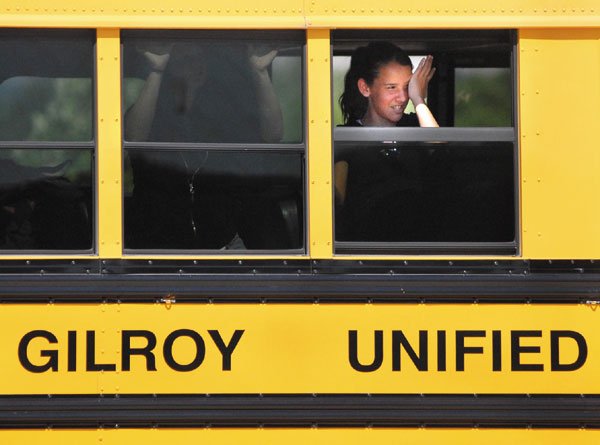An annual out-of-state excursion for high school drama students spawned some “healthy conversation” last week between parents, students, teachers and school board trustees, who addressed a heightened scrutiny for any field trip that causes students to miss instructional class time.
Thursday’s Board of Education meeting marked the second occasion in two consecutive years where Christopher High School’s mid-September overnight trek to the world-renowned Shakespeare Festival in Ashland, Ore. became the subject of concerned discussion.
School board trustees unanimously approved the trip, which will cause 21 students, one teacher and possibly CHS Vice Principal Greg Kapaku to miss an entire Friday of school.
Dialogue surrounding the trip reopens the touchy topic of students missing class due to sports, music club or theater-related reasons.
“One of the big topics of discussion for well over a year by board has been the topic of field trips and number of days students have missed by going on field trips,” GUSD Superintendent Debbie Flores explained. “We are closely scrutinizing them.”
With an abbreviated school year truncated to 173 days – which includes 10 unpaid teacher furlough due to gargantuan state budget cuts – vigilance for keeping students at their desks is at an apex.
Horizon-expanding learning opportunities that take place beyond classroom walls are increasingly endangered – at least, those that don’t occur during the summer, holidays or weekends.
The ripple effect finds educators toeing the line between ensuring their students receive maximum instruction minutes in core subjects such as math, writing and science, while struggling to protect enrichment opportunities that “inspire students to be more than they ever dreamed,” and expose them to a world “that’s bigger than Gilroy,” as CHS AP English teacher Emily Diaz stressed.
School board trustees and site administrators, consequently, are reviewing every outing with a fine-toothed comb. As it is, field trips already require approval from the site principal, the district office and the school board (if the trip is out of state or overnight).
It’s trying for CHS Principal John Perales, who gets put “in a difficult situation as to which to approve and why to approve them and why not, when others are simply approved because they’ve been long-standing or they’re not overnight,” he said. “It does put us in an odd position.”
Last year, pressure to defend her field trip in a climate of growing administrative concern over missed instructional minutes prompted CHS drama instructor Kate Booth to document instances of student-athletes leaving her fifth and sixth period classes to attend practice or games.
During the 2011-12 school year, Booth calculated CHS students missed an average 1,821 instructional minutes, or 21 percent of class time, per month. There are approximately 8,520 instructional minutes in a month, according to Perales.
Drama students, alternately, will gain during their Oregon trip an additional 635 instructional minutes (the equivalent of two school days) while attending post-performance discussions, taking backstage tours, viewing back-to-back comedies and tragedies and touring the Southern Oregon University campus. The trip is paid for by the CHS Drama Club.
“Why is this field trip such a sticking point when we have students that are missing class time all the time?” Booth questioned.
Booth says she is not against students playing sports, but wants the playing field to be leveled when it comes to scrutinizing missed instructional minutes.
Amber Woodward, CHS Dept. Chair for Visual and Performing Arts, also addressed the reality of student-athletes being released early from class on a daily basis.
“I had eight students leave my classroom today for various activities in sports,” she said. “This is an ongoing thing.”
Woodward was one of roughly 15 speakers who addressed the board Thursday evening to voice support for the “grand experience” in Ashland.
After speakers impressed the value of out-of-classroom experiences that contribute to a well-rounded education, school board trustees reciprocated by reiterating: They are not against field trips, nor do they question the educational value of the Ashland excursion.
As underscored trustee Rhoda Bress, whose three children once had Booth as a drama instructor, board members are under “an obligation to protect instructional minutes.” Trustees must also question whether alternative trips in local destinations were considered, as well as how many teachers will miss school as a result of chaperoning the trip.
To this, Booth reminded trustees that 12 staff members accompanied CHS seniors on their end-of-the-year trip to Disneyland last year.
“You’re bringing up things that are on our radar as well,” replied Board President Tom Bundros, although Superintendent Flores pointed out all those teachers were senior teachers only.
The heart of the issue, Bress said, is preventing students from missing critical, core subject classes, which she says can ultimately affect California Standardized Testing results. Had the Ashland trip come before the board several months ago for approval – rather than so close to the Sept. 21 date of the trip – “I don’t know that I would have voted for it,” she said.
The dialogue segued to what Bress praised as an example of teachers and administrators making “more of a team effort” to cooperate in identifying extended learning opportunities that won’t cause students or teachers to miss school. Bress and Booth discussed the possibility of taking students in the summer to the Oregon Shakespeare Festival, which has an eight-month season. This alternate option, however, would limit a third of the students who will be able to attend. Booth explained drama students are given first priority to attend the trip, while remaining openings are later made available to students in English classes and Booth’s Page to Stage course.
Trustee Jaime Rosso, additionally, suggested the possibility of bringing traveling theater companies to schools.
As for athletes missing afternoon classes, Bress says this is an ongoing concern trustees have worked to address and will continue to monitor. At Gilroy High School, for example, Bress said the weekly block schedule was changed up this year so students have different classes at varying times and days.
Still, “this is a systemic problem,” Bress acknowledged. “Until the actual system changes and until there is enough of an uproar about students missing instructional minutes for being pulled out for athletic activities, then the system will stay the same.”
During the Sept. 6 meeting, Phil Garcia spoke in support of his grandson Jacob Garcia, president of the Christopher High School Drama Club. Phil Garcia presented CHS drama instructor Kate Booth with a check for $500. The money, which will go toward the Sept. 21 trip to the Shakespeare Festival, was donated by the Veterans of Foreign Wars Post in Gilroy.














